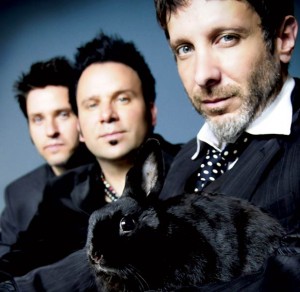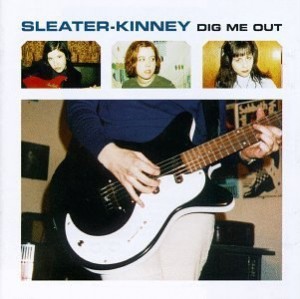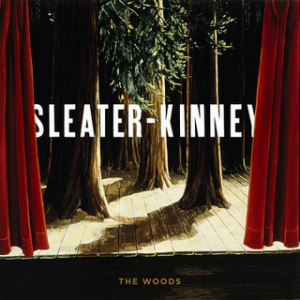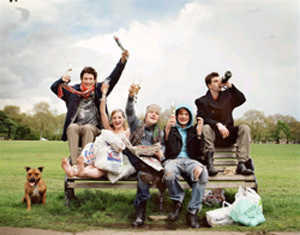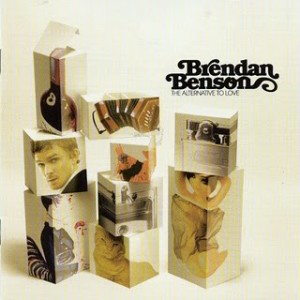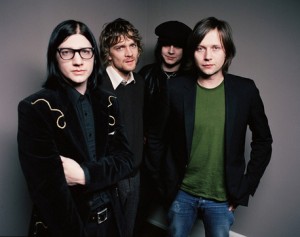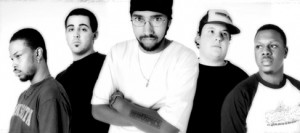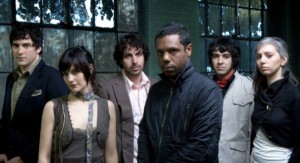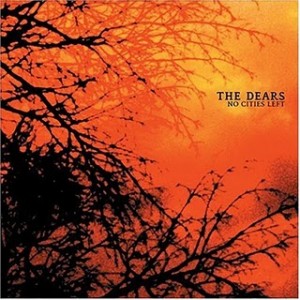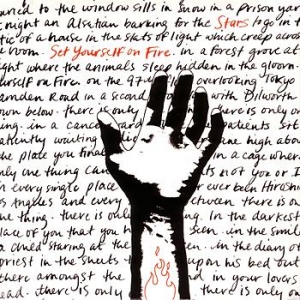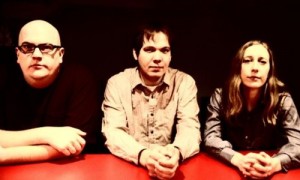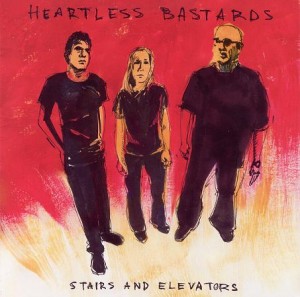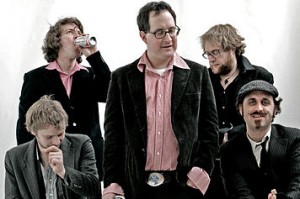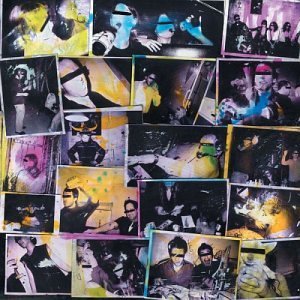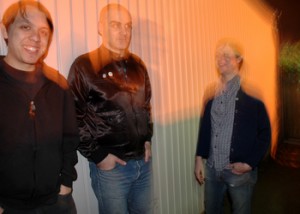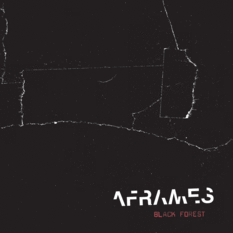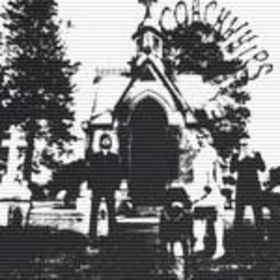FOREWORD: It was at Mercury Lounge’s basement backstage area after a truly rewarding set that I met friendly Brooklyn-via-Cincinnati combo, The National. They were touring to support Alligator, the soothingly noir breakout album that’d bring ‘em an international audience. During ’07, The National released stunningly accomplished masterpiece, Boxer, and got to play with their idol, Bruce Springsteen, rendering a Woodie Guthrie number in concert. This article originally appeared in Aquarian Weekly.
What happens when two Ivy League brothers hook up with two equally schooled siblings and a maudlin baritone singer in the Carroll Gardens section of Brooklyn? They form judicious combo, The National, self-release an eponymous ’01 debut before ever playing a single show, and get red hot Interpol producer Peter Katis to work on a few very consistent follow-ups. Strangely, all five members are long-time pals hailing from Cincinnati who’d moved east looking for conventional jobs instead of a risky music career.
“We were in New York City five years before we began hanging out doing music,” singer Matt Berninger recalls.
Luckily, the gravitational force bringing these Ohio buddies together was compelling enough to beget the embracing pop grandeur they so intimately surrender. Much like Jersey band, The Wrens, a cohesive, tightly knit unit with only one set of brothers, The National takes a democratic approach to building lathered arrangements. This balance of power deters each individual from going off on a tangent or becoming too precious about any singular influence on the entire oeuvre.
Columbia University grad Aaron Dessner (guitar-bass) and Yale alumnus Bryce Dessner (guitar) must’ve been taught the fine art of interdependency since their beautiful melodiousness resonates so mellifluously alongside Berninger’s fellow University of Cincinnati graphic design major Scott Devendorf’s four-and-six string illuminations and Soho Press employee Bryan Devendorf’s pliant percussive patter.
For the record, Berninger and Scott Devendorf had made one unheralded record under the feminine moniker, Nancy, doing a few small local gigs/ parties ‘round ’91, then temporarily drifted apart. Meanwhile, the others were in Project Nim making soft-toned 10,000 Maniacs-like folk-pop. Though The National’s initial recording offered restrained alt-Country leanings, ‘03s Sad Songs For Dirty Lovers diversified the stylistic presentation.
“I’d compare the first one to the Silver Jews. It was made up in the basement. After touring a bit and feeling the adrenaline of going onstage, we began playing more aggressively,” Berninger lets on. “But we’re still finding out what type of band we are. As good as Sad Songs was, it’s not as comprehensive or competent as the widely varying third album. Song structures have improved.”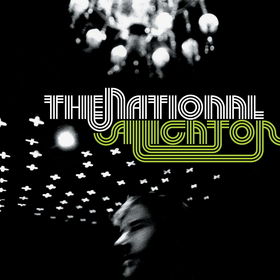
Now signed to Beggars Banquet, Alligator finds the moodily deep-voiced frontman becoming hauntingly introspective rendering the shrouded “Secret Meeting” (‘in the basement of my brain,’ no less). On delicate acoustic-folk serenade “Daughetrs Of The Soho Riots,” he almost sounds like a grim Morrissey dolefully gesticulating ‘break my arms around my love.’
Of the latter, Berninger explains, “That’s about holding on to something too tight – ‘til it snaps. And although there never were ‘soho riots,’ it’s an ironic reference to the Daughters Of The Revolution, living in Manhattan’s fancy Lower East Side hipsterville, and getting lost in the middle of (fashionistas) massing the streets.”
In loud contrast to the gloomier episodic ventures, the outwardly exuberant “Lit Up” rushes forth with youthful buoyancy and circular jangled riffs entangle dapper helix “Looking For Astronauts.” Resounding “Abel” revs up the amps before subtle symphonic retreat “Geese Of Beverly Road” returns to introversion.
“We’ve had a version of “Abel” for awhile. It was a more subdued dark ballad drastically changed by a snappy drumbeat. We made it more interesting. It’s a whole different monster,” Berninger confides.
Undoubtedly, The National had great outside assistance putting the expansive Alligator together. Peter Katis mixed the disc and did some recording after engineer Paul Mahajan (Yeah Yeah Yeahs/ TV On the Radio/ Liars) set up practice spaces and captured the five-piece on Pro Tools.
Berninger contends, “Peter has an integral part – cleaning up our sound, whereas Paul was the captain of our ship.”
Furthermore, Australian composer Padma Newsome (from the Clogs) orchestrated neo-classical elements, adding textural complexity via oboe, cello, violin, viola, clarinet, and French horn. Both “Baby We’ll Be Fine” and “Val Jester” recall the half-spoken reflections and spare dourness of Tindersticks’ Stuart Staple, whom, like Berninger, draws on the brooding monotone melancholia Nick Cave and Leonard Cohen seemingly crave. Better still, the reverberating triumphant finale, “Mr. November,” with its crashing cymbals and bashing skins, penetrates deeply as the resolved choral summit ‘won’t fuck us over’ and lucid guitar intensity swell.
“The truth is, seeing regional Cincinnati band the Afghan Whigs get popular nationally was incredibly inspiring,” Berninger gladly opines. “They broke out of the small music scene to become semi-legendary. When I was living there, the Ass Ponys, Tiger Lillies, and Guided By Voices (from nearby Dayton) had a healthy support contingency. Everyone did their own thing. Brainiac was groundbreaking making totally out of nowhere stuff. Maybe living in the midwest gets people looking far and wide for exciting music from all different corners. They look outside Cincy for inspiration. Plus, radio station 97X have a lifeline to underground music. That had a lot to do with aspiring artists gaining access to good radio. There’s not a station like that in New York.”
So where’d they come up with the punchy title, Alligator?
“We took it from (the somber) “City Middle,” which references ‘I wanna go gator round a warm bed.’ Like a predatory male reptile, we hope it matches the undercurrent of tension.”
